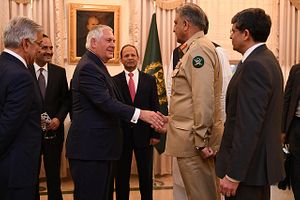U.S. Secretary of State Rex Tillerson touched down in Afghanistan for a brief visit Monday, where he met with Afghan President Ashraf Ghani and Chief Executive Abdullah Abdullah. As Ankit Panda noted, the visit lasted only a few hours and his remarks before departing focused on Pakistan, the next leg of his multi-state trip through the Middle East and South Asia.
On Tuesday, Tillerson was expected to take the administration’s message to Islamabad.
Two months ago President Donald Trump unveiled his South Asia policy, saying, among other things, that “Pakistan often gives safe haven to agents of chaos, violence, and terror.” He also highlighted India’s contributions to “stability in Afghanistan,” and said “we want them [India] to help us more with Afghanistan, especially in the area of economic assistance and development.”
On October 18, before embarking on his international travels, Tillerson gave a major policy speech focused on India in which he referred to Delhi as a “partner for peace in Afghanistan.” The administration views its strategy as a South Asia strategy, rather than just an Afghanistan strategy — a nod to the complex regional web in which Kabul is ensnared.
“[Y]ou solve Afghanistan by addressing the regional challenges,” Tillerson said. “And Pakistan is an important element of that. India is an important element of how we achieve the ultimate objective, which is a stable Afghanistan which no longer serves as a platform for terrorist organizations.”
A Reuters report suggests that just as Tillerson will give his Pakistan interlocutors an earful with regard to Pakistani shielding of the Afghan Taliban and Haqqani Network, he can expect to be warned against pulling India further into Afghanistan affairs.
Reuters quoted Miftah Ismail, a state minister and ally of Prime Minister Shahid Khaqan Abbasi as saying, “Bringing India into the mix is like adding kerosene to fire… It’s a complete red line. India has no political role to play in Afghanistan as far as we are concerned.”
During his October 18 India policy speech, Tillerson categorized India’s role in Afghanistan as providing development assistance, echoing Trump’s strategy speech.
Pakistan’s military and political leaders see increased Indian involvement — of any kind — in Afghanistan as a potential threat. And India’s involvement in Afghanistan certainly has stretched beyond mere economic endeavors. For example, in August India and Afghanistan signed an arms deal in which India will pay Russia to supply Afghanistan with arms and equipment.
While in Pakistan, Tillerson is expected to meet with Abbasi, Foreign Minister Khawaja Asif, and Army Chief General Qamar Bajwa. The Express Tribune, a Pakistani paper, reported that Tillerson “was quietly greeted by a mid-level Foreign Office official at the military airport in Rawalpindi – a welcome devoid of the pomp that usually marks high-level visits.”
Such a cold welcome is perhaps linked to the tone Tillerson took in his Afghanistan remarks.
“We have made some very specific requests of Pakistan in order for them to take action to undermine the support the Taliban receives and other terrorist organizations receive,” Tillerson said after his meeting with Afghan leaders. “We’ve said in this whole strategy this is a conditions-based approach, and so our relationship with Pakistan will also be conditions-based.”
The chairman of Pakistan’s Senate, Raza Rabbani, pushed back against Tillerson’s comments. During a Senate session Tuesday, Rabbani said Tillerson’s “statement seems like that of a viceroy’s before they visit a country,” going on to call the secretary’s tone “inappropriate.” Rabbani also stated, “It appears that the U.S. secretary of state has put forward some conditions to the prime minister” and that those conditions should be shared with the country’s legislature.
After his meetings in Pakistan, Tillerson is scheduled to fly to New Delhi for the India (and final) portion of his trip before heading back to Washington on October 26. He’s scheduled to meet with External Affairs Minister Sushma Swaraj and Prime Minister Narendra Modi on October 25.
After meeting with Tillerson on Monday, Afghan President Ashraf Ghani flew to New Delhi, where he met with Swaraj and Modi on Tuesday.
Ghani and Tillerson won’t cross paths in New Delhi (Ghani is scheduled to depart a few hours before Tillerson arrives, according to the Indian Ministry of External Affairs’ released schedules), but Tillerson will be only a day behind the Afghan president in speaking to Indian leaders. Furthermore, Afghan CEO Abdullah and Foreign Minister Salahuddin Rabbani were in India in late September and India’s national security advisor, Ajit Doval, visited Kabul last week, underscoring the amount of shuttle diplomacy underway in South Asia.

































